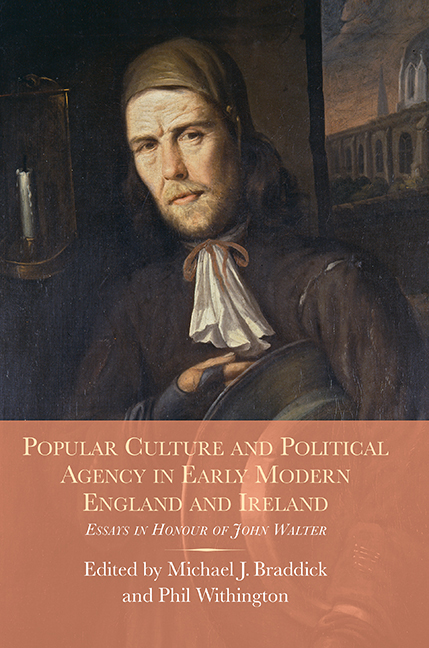 Popular Culture and Political Agency in Early Modern England and Ireland
Popular Culture and Political Agency in Early Modern England and Ireland Published online by Cambridge University Press: 09 May 2017
In 1642, Anne Read's husband died of grief. In the same year, Sir Con Magennis died tormented by his evil deeds and ‘much … affrighted with the apprehension and conceipt that … Mr Tudge [a minister he had slain] was still in his presence’.Early modern people attributed huge consequence to ‘passions’ (they would not have used the word ‘emotion’) like grief, anger and fear. When uncontrolled, ‘passion’ started wars and ended life. Little wonder that contemporaries urged the restraint of potentially damaging feelings. However, there were times when emotions were particularly difficult to check.
John Walter's recent work on the collection of documents called the 1641 Depositions has assisted in building a new understanding of the outbreak of waves of violence in Ireland in 1641–2 and subsequently. The depositions contain testimonies from about 3,000 people, mostly British Protestant settlers, who had been dispossessed of their lands, homes and goods by Catholic rebels. Some had been confronted by crowds of local people, though as the rebellion continued, gentlemen tended to take over the leadership of these attacks. Either way, most of the deponents could identify at least some of those involved. The majority had been threatened with violence, and many bore tales of loss of property, personal injury and the torture and violent deaths of their family members, friends and neighbours. There were also accounts of incidents of desecration of sacred space and iconoclasm and of the deliberate humiliation of victims, who were routinely stripped and insulted. The depositions also contain a later set of ‘examinations’, usually conducted to probe particular crimes that had occurred in the early 1640s. The testimonies here included those of both settler and native witnesses and alleged perpetrators. It is no surprise, therefore, that Nicholas Canny should have described the depositions as ‘a body of material which is emotional’. Historians of the period often reflect on the emotional state of the Gaelic Irish and Old English participants, to paint a picture of simmering humiliation, shame, resentment, hostility, fear, hatred, anxiety and despair that led to outpourings of vengeful rage. Though economic and other grievances are pinpointed as arousing these emotions, they are regularly fathered above all on religion: Inga Jones argues that ‘religion has the capacity to arouse passions which go beyond what political and localist concerns can stimulate, a passion which … could and did spill over into unrestrained slaughter’.
To save this book to your Kindle, first ensure [email protected] is added to your Approved Personal Document E-mail List under your Personal Document Settings on the Manage Your Content and Devices page of your Amazon account. Then enter the ‘name’ part of your Kindle email address below. Find out more about saving to your Kindle.
Note you can select to save to either the @free.kindle.com or @kindle.com variations. ‘@free.kindle.com’ emails are free but can only be saved to your device when it is connected to wi-fi. ‘@kindle.com’ emails can be delivered even when you are not connected to wi-fi, but note that service fees apply.
Find out more about the Kindle Personal Document Service.
To save content items to your account, please confirm that you agree to abide by our usage policies. If this is the first time you use this feature, you will be asked to authorise Cambridge Core to connect with your account. Find out more about saving content to Dropbox.
To save content items to your account, please confirm that you agree to abide by our usage policies. If this is the first time you use this feature, you will be asked to authorise Cambridge Core to connect with your account. Find out more about saving content to Google Drive.